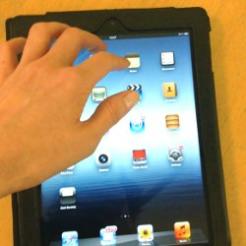John Tate asks whether the inexorable rise of the tablet will spell the end for the humble PC.
Last month, a leading market research company, IDC, reported that PC (personal computer) shipments had fallen by 14 per cent – the worst quarter in the 20 years since IDC first produced this information.
This was the fourth consecutive quarter of declining PC sales and the share prices of the likes of Hewlett Packard, Intel and Microsoft fell in response.
I have been commenting on the changes happening with desktops for some time, and imagine that this news will therefore come as little surprise to civilsociety.co.uk readers.
Beginning of the end?
So is this the beginning of the end for the PC? Last year, according to IDC again, tablet sales rose by 78 per cent. They are predicted to outsell conventional desktop devices this year, and portable PC sales in 2014. Apple is the dominant supplier in this area. Will tablets replace the PC?
The ‘cloud’ is much talked about. Increasingly we are using web-based applications and, for the consumer, a tablet – such as an Apple iPad – is a very tempting alternative to a PC.
However, for a business or charity user, Microsoft-based software still dominates the applications we use. Many of these do not run on a tablet, or Apple device.
Switching all these to a cloud solution will not be straightforward. Simple applications might have cloud offerings that support a tablet or other non-PC device, but solutions may not exist for more complex products such as accounting or CRM (customer relationship management).
The firm grip Microsoft has held on our work desktop and mobile devices is loosening, but if the PC is to fade out it how long will that take? This is an important question when considering the next round of investment in new devices and upgrades.
Extended support for Microsoft XP is ending in April next year. Windows 8 is receiving mixed reviews in the industry and business press. Is it time to seriously look at alternatives for the workplace?
I think the answer to this lies in how quickly the software we use on a PC will become available on other devices. Let’s have a look at an example.
Last month I was asked by a team of people involved in a new business start-up to help them prepare their business plan. They had created the first version of this in Google docs. For those not familiar with this, Google docs includes spreadsheet, word-processor and presentation software.
You need to be connected to the web to use this, and all your work is automatically saved on a Google server. The basic product is free for personal users but charges apply for the business edition. Discounted or free products are available to eligible charities.
So off I went, working mainly on the spreadsheet. I’d regard myself as intermediate in terms of my Excel skills. With this knowledge I was up and running with the business plan material in minutes. Formulae and the approach to navigation are almost the same as other products.
Within a couple of hours I had created a basic profit-and-loss account, cashflow forecast and balance sheet. I had around a dozen workbooks linked to these, with supporting data.
Nice features
All the features I needed for the plan were in Google docs. Interestingly, I used a PC to access this while the rest of the team worked with Apple Macs. One of the nice features of the product was that I was able to edit the spreadsheet at the same time as someone else.
However, I did have a period when my internet access was unavailable and I could not then work on the material. Also the Google spreadsheet does not run fully on an Apple iPad, with only a limited number of the features supported. And finally there are many more advanced features of a spreadsheet that Google docs itself does not offer.
So, right now, it seems like there is some way to go before an Apple iPad running a Google docs spreadsheet can replace a PC running Excel. But an Apple Mac might be a choice?
Next stop, accounting and CRM. I’ll see if I can find an opportunity to try web-based apps for these for real, and will report back on progress in the coming months.
John Tate is a business consultant, IT adviser to CFG and a visiting lecturer at Cass Business School









